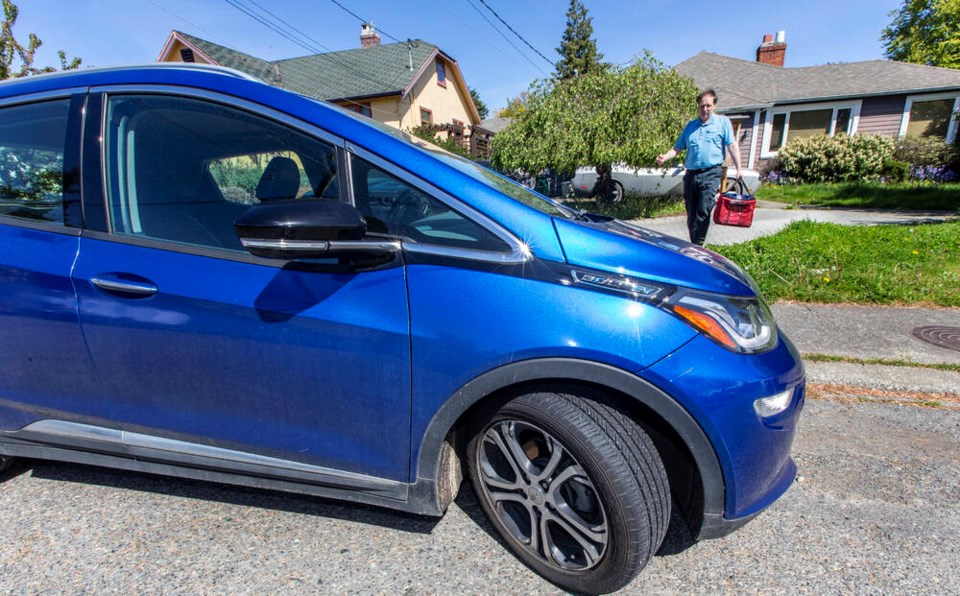Skip the Dishes driver Bill Cox is happy he decided four years ago to buy an electric car to save on fuel costs.
“I was looking at how much I was spending before on gas,” Cox said. “I just thought fuel payments, paying for my car at the time, would that be close to what would be payments on an electric car? I thought yes, so I went for it.”
Cox said that if he had a conventional vehicle right now, he would be choosier about doing food deliveries outside of Victoria’s boundaries.
Soaring gas prices have been hard on the bottom line for meal deliveries and other businesses dependent on moving people and goods around. On Tuesday, Greater Victoria drivers were paying as much as $2.219 for a litre of gas, although some stations had dropped to $2.099.
Mohan Kang, the Victoria-based president of the B.C. Taxi Association, said he has heard prices could jump another five cents per litre in the coming week. “So there is no end to it,” Kang said. “Like anybody else, especially being a commercial vehicle, it is tough.”
Rising fuel costs directly affect taxi drivers’ income on a shift-to-shift basis, said Kang, who called on the provincial government government to take steps to mitigate the high cost.
Taxis are a necessary means of travel, especially in small communities where no other public transportation systems are available, he said.
B.C. Transit said in a statement that the rising cost of fuel won’t affect its ability to provide service, since it receives a discounted price through its existing fuel contract. “In addition, the compressed natural gas buses in B.C. Transit’s fleet help mitigate the impact of diesel-fuel price increases.”
B.C. Transit said it continues to work on its low-carbon fleet program, aiming for a zero-emission provincial fleet by 2040.
“Public transit offers an affordable and reliable mode of transportation for people considering alternatives to driving, and is a more sustainable and environmentally friendly method of travel,” the statement said.
In the legislature on Tuesday, Solicitor General Mike Farnworth blamed rising gas prices on factors outside of British Columbia— notably Russia’s war on Ukraine, which has drawn sanctions from the international community.
“They don’t think that the war in Ukraine is having an impact on gas prices here and right across North America andaround the world?” Farnworth said in response to groans from opposition members. “Every gas expert will tell you that’s exactly what is happening.”
Gas prices are going up across the country, but are highest in B.C.
B.C. Liberal MLA Trevor Halford said gas prices in the province were high prior to the war in Ukraine and have risen 90 cents a litre since the NDP formed government in 2017.
“Skyrocketing gas prices mean the cost of everything is going up,” Halford said. “For a commercial truck to fill up before, it was $650, now it’s over $1,500. Filling up a tractor used to cost $230 — now it’s over $800 a day.
“The cost of everything is going up, especially groceries and it’s making it harder for families to put food on the table,” he said, asking the government to deliver promised relief.
Opposition members suggested a three-pronged plan to temporarily bring down gas prices or lessen the impact of spiking prices on consumers: suspending provincial gas taxes, as Alberta did on April 1; stopping the levy of 25 cents a litre on fuel imports introduced Jan. 1; and introducing a one-time rebate to the income-threshold based climate action tax credit through the federal government.
Liberal MLA Peter Milobar, representing Kamloops-North Thompson, asked the premier during question period if he would consider even one of those measures “to try to raise some short-term relief to people in British Columbia that simply cannot get by anymore with record high gas taxes in British Columbia.”
Gas taxes vary across the province but are about 38 cents a litre.
“We very clearly have government policy and government taxation at play that is out of sync with what’s going on in neighbouring jurisdictions and the government needs to address that,” said Milobar, noting the government has several billions of dollars worth of unallocated contingency funds in its budget to help bring down the price at the pump.
The NDP government reiterated Tuesday steps they have taken to lower overall costs for families in the province, including reducing the cost of automobile insurance last year and approving a one-time gas rebate.
Most drivers who have a basic auto insurance policy will receive $110 and most commercial drivers, who tend to have higher expenses, will get $165 through the rebate.
“Those cheques are going out … this very month,” Farnworth said.





